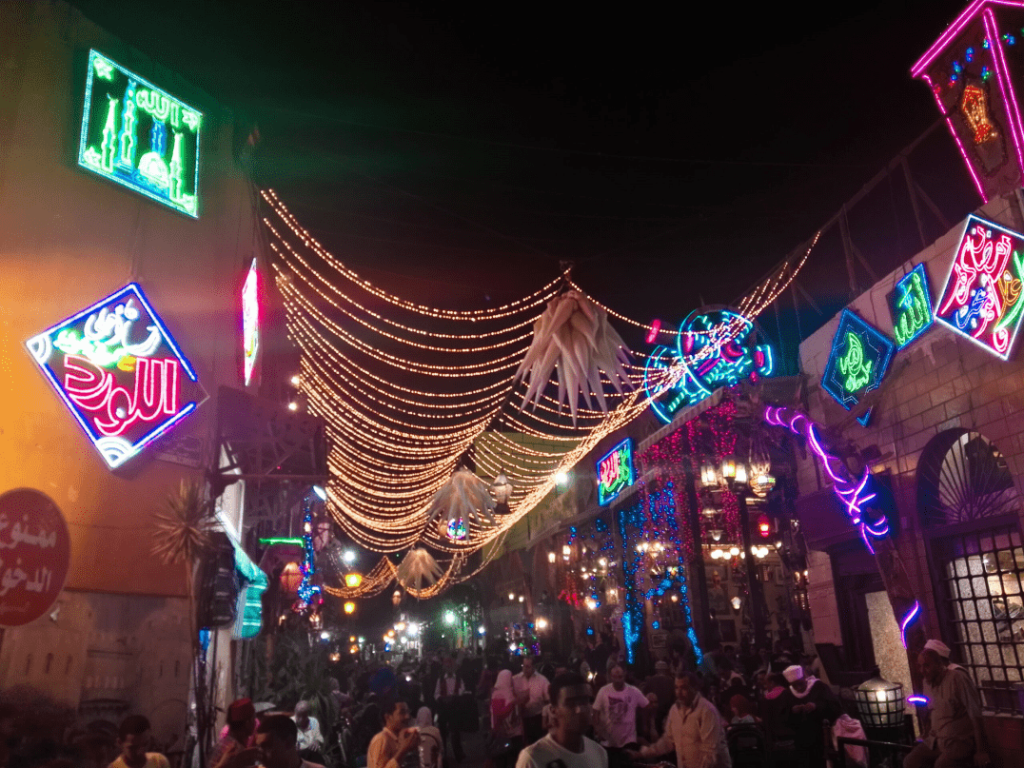Ramadan is the ninth month of the Islamic calendar, a time of fasting, prayer, and celebration for Muslims. But in Egypt, this month takes on a special, vibrant character like no other. If you’re planning a visit, traveling during this month offers a unique opportunity to experience authentic Egyptian culture and gain a deep understanding of the traditions that make Ramadan in Egypt a truly magical experience.
Experiencing the Unique Spirit of Ramadan in Egypt
Ramadan is a month of deep spirituality and communal celebration that truly comes alive in Egypt. While Muslims worldwide observe the fast, the social and cultural traditions of Ramadan in Egypt are what make it extraordinary. It’s a time when the streets, mosques, and homes buzz with a unique sense of togetherness. Families and friends gather for lavish Iftar feasts, neighbors share food, and the entire community seems to slow down during the day to focus on worship and charity. This strong communal spirit and the blend of ancient traditions with modern festivities create an atmosphere that is both deeply personal and universally joyful.
The General Atmosphere of Ramadan
During the holy month, the rhythm of life in Egypt shifts, creating a fascinating duality between a calm, spiritual daytime and a vibrant, festive nighttime.
Quiet During the Day
The streets are noticeably calm during daylight hours, especially in the mornings. This provides a perfect opportunity to visit major tourist sites like the Pyramids, museums, and ancient temples without the usual crowds.
The Magic of the Night
As soon as the sun sets, the atmosphere completely transforms. The streets and buildings are illuminated with colorful lanterns, and families and friends gather to celebrate. The nightlife in Cairo becomes exceptionally vibrant, with cafes and restaurants staying open until the late hours of the night.
Unique Egyptian Ramadan Traditions
Egypt is famous for its traditions that are not seen anywhere else, adding a special charm to the holy month.
- The Fanous (Lantern): An iconic symbol of Ramadan in Egypt, its origin dates back to the Fatimid era. Today, it is used to decorate homes and streets, and children carry them while singing Ramadan songs.
- The Mesaharaty (The Dawn Drummer): A traditional character who walks the streets before dawn, beating a small drum to wake people up for their Suhoor meal (the pre-dawn meal).
- Mawa’id Al-Rahman (Tables of Mercy): Public Iftar tables set up in the streets to offer free meals to the needy, travelers, and anyone who needs a meal to break their fast. This tradition embodies the community and compassion of the Egyptian people.
- The Iftar Cannon: The moment of breaking the fast is announced by a loud cannon blast from the Saladin Citadel in Cairo, a tradition dating back to the Ottoman era.
Does Ramadan Affect Tourists in Egypt?
This is a common question asked by many visitors. The answer is yes, Ramadan in Egypt does affect some things, but not in a negative way at all. On the contrary, it adds a unique cultural dimension to your trip.
Impact on Daily Life
- Working Hours: Banks, government offices, and museums may close earlier than usual. It is best to check the times in advance.
- Transportation: Public transport can be very crowded right before Iftar as people rush to get home.
Dining and Food
- Dining Options: Some local restaurants may close during the day. However, restaurants in tourist areas and hotels will remain open.
- Nighttime Feasts: After Iftar, food feasts are everywhere. You can try traditional Ramadan sweets like:
- Konafa and Katayef: Famous desserts served throughout the month.
- Drinks: Such as Karkadeh (hibiscus), Tamarind, and Qamar El Din (apricot juice).
Cultural Etiquette
- Public Eating: It is best to avoid eating, drinking, and smoking in public areas during the day as a sign of respect for those who are fasting.
- Dress Code: Modest clothing is appreciated, especially in religious sites, but there are no special rules for tourists in other places.
- Greetings: You can greet fasters with “Ramadan Kareem” or “Ramadan Mubarak.”
Best Activities for Tourists During Ramadan
Traveling to Egypt in Ramadan is a rich experience full of cultural activities.
- Stroll in Historic Cairo: Visit the historic streets like El-Moez Street and enjoy the decorations and lanterns.
- Attend a Tanoura Show: Enjoy Sufi-inspired spinning dance performances at places like “Wekalet El Ghouri.”
- Visit Ramadan Tents: Many hotels and cafes set up special “Ramadan Tents” where they serve Iftar and Suhoor meals along with entertainment.
- Share Iftar: You may be invited by an Egyptian person to share Iftar with their family, which is an authentic experience that shows the generosity of Egyptian hospitality.
In conclusion, a trip to Egypt during Ramadan is not just a visit, but a cultural journey into the heart of Egyptian heritage and a unique opportunity to experience the country’s true spirit. It is not a month of silence, but a month of joy, togetherness, and celebration.
If you wish to learn more about the Arabic language, download our Arabic learning app.



